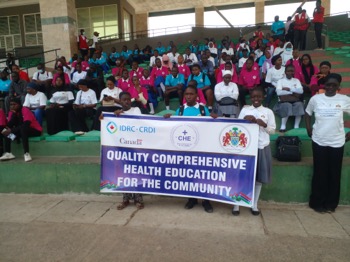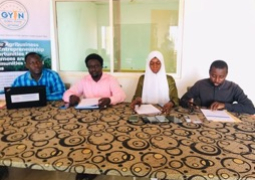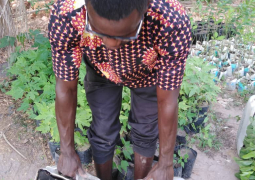
The tour, which brought together six schools within Banjul, was meant to educate and inform communities, parents, youth especially women on how to protect themselves against sexual and reproductive health problems.
Despite numerous efforts and policy frameworks to improve sexual and reproductive health of young people, adolescents (15-24) who constitute 32% of the population in The Gambia, still lack access to quality Comprehensive Health Education (CHE) on preventing and protecting themselves against sexual and reproductive health problems.
Addressing the gathering, Phebian Ina Grant-Sagnia, Principal Research Officer, Ministry of Health, said that they conducted the caravan tour to create more awareness on the issue.
“Because not all are benefitting from what we are doing. This is the reason we decided to reach out to all wards in Banjul in the form of a caravan so that people can hear and learn from our sensitisation,” she said. She added that the concept of the caravan on sexual comprehensive education was a right based approach to talk to the young ones to transfer knowledge and acquire skills from the knowledge they have acquired.”
She observed that there are a lot of social factors regarding sexual comprehensive education, in view of the fact that a lot of parents don’t talk to their children about reproductive health.
“This is why we are talking about guidance and counseling, society and culture, values and attitudes, and life skills. This is because sexual education is comprehensive and is not only limited to reproductive health.”
Amie Jaiteh, education officer at MoBSE noted that strengthening access to quality comprehensive health education is a big concern to the education ministry.
She added that they feel the need for their learners to be equipped with knowledge on comprehensive health education so as to know how to survive the challenges of the world and to be able to care for themselves.
“It is important that young learners take the lead by going around the city of Banjul and sensitise people about comprehensive sexual education.”
Landing Sonko, Senior education officer at MoBSE, who also doubles as one of the school supervisors for the project, said the caravan is very important as it helps to sensitise communities about the role and objective of the project.
“Talking about reproductive health to young ones will help to prepare them for their future so that they will become responsible future leaders of the country.”
Ebrima Barry, a university student, said participating in the reproductive health caravan is very important for him, saying those are isues that most of them didn’t have the opportunity to learn or know about at their homes.
“At school, we do have the opportunity to learn about it but in most cases, teachers don’t also talk about them the way they want to hear them or supposed to learn them.”
“Most youths see changes in their body though they might know it’s puberty, but don’t know the repercussions and consequences that might occur. And most of these youth don’t know the time they might get pregnant or even take care of themselves, especially ladies.”
Anna Ndong, a student from St. Joseph Senior Secondary School, underscored the importance of comprehensive health education especially for youngsters saying that gives them the proper equipment they need to take care of themselves when they are growing and at the age of puberty.





